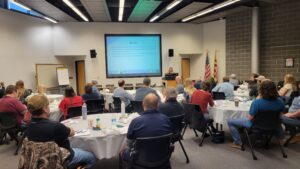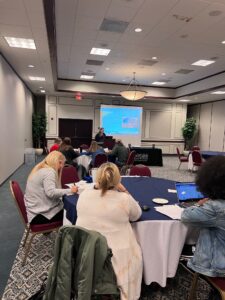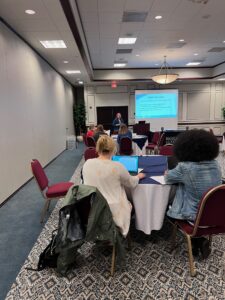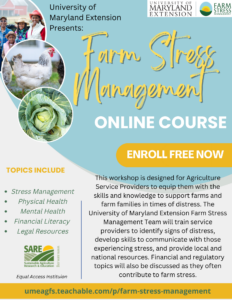Final report for ENE20-160
Project Information
Problem and Justification
University of Maryland Extension (UME) is concerned and sensitive to the current stress level of farm families as it relates to their well-being and the viability of the farm. Sustained distress affects a farmer’s ability to cope, make sound decisions, and adopt new practices associated with their health, finances, regulatory, and production practices. Reports from the USDA, popular press, Centers for Disease Control, farm nonprofits, and universities recognize that farmers and farm families are experiencing high levels of stress, mental health, and even suicide. Locally, agricultural service providers are a trusted source of information to farmers and are aware of increasing stress levels in the farm community.
Solution and Approach
Service providers often do not have training in the health and wellness field therefore University of Maryland Extension designed a training in awareness, knowledge, and skill development around farm stress and mental health. The training was not meant to teach counseling but to educate service providers on how to interact with a sensitive and often uncomfortable situation. By gaining skills to identify stress and have a conversation with farmers, service providers are better prepared to work with individuals and families who are experiencing high levels of stress. Providers gained the ability to effectively communicate about stress, analyze situations, provide resources and suggest solutions. The approach for the educational program was through webinars, face-to-face workshops, online content and a statewide forum. Moderated discussion groups continued the conversation, provided ongoing support, and shared new resources. A self-study online module was created for new employees who did not attend the in person trainings.
Milestones and Performance Target
This project educated 178 agriculture service providers about farm stress, mental health, communication techniques, available resources, and financial risk management. A preliminary statewide forum was held for agencies to discuss rural health and resources reaching 42 participants and citing physical and mental health topics and stress management as major topics of educational focus. Statewide trainings were conducted reaching 178 agricultural service providers and webinars reaching 167 participants. Additionally, the project created a list-serve of contacts and an online discussion group to provide up to date information and resources. The current website was enhanced adding fact sheets, videos and resources. Learning objectives for the training were: Understanding the impact of stress on our bodies; Confidence to identify signs and symptoms of stress; Confidence communicating with someone with stress; Understanding warning signs of suicide; Promoting mental health resources for farm families; Creating personal and farm finance goals; Managing farm financial statements; Promoting legal resources for farm families; and Negotiating contracts and debt management. Six agricultural service providers reported sharing knowledge and skills gained in the workshop with 27 farmers who they work with directly.
Ninety agricultural service providers will communicate with farm families and educate 1350 farmers about the resources and tools in the area of mental health and wellness. These service providers will also educate farmers in the areas of personal and farm finance goals, farm financial statements, legal resources for farm families and negotiating contracts and debt management resources.
University of Maryland Extension (UME) has hosted a statewide forum and cosponsored four workshops in 2019 on communicating and managing farm stress for agriculture stakeholders. Attendees reported intentions to use the gained knowledge to support farmers but also requested the workshop to be offered to agriculture service providers.
A survey in 2020 of UME winter production workshop participants, (517 farmers and agriculture professionals) found that 43% reported higher stress levels than last year and 34.7% reported high levels of stress (7 and higher out of the 1-10 scale). The respondents reported financial (52%) and regulatory (41%) aspects of farming contribute the most to their stress. Not properly addressing high levels of stress can lead to a number of health issues.
Sustained stress affects farmers’ ability to cope and make decisions to adopt agricultural, financial, and legal practices to address their situations. UME programs provided comprehensive training for agriculture service providers resulting in increased knowledge and skills in understanding and managing stress, communicating and providing resources for farmers under stress, and providing financial and legal management to address stressors. The project provided solutions to support farmers through stressful times.
Cooperators
- (Educator)
- (Educator)
- (Educator)
- (Educator)
- (Educator)
Educational Approach
This project equipped 286 agricultural providers with skills and knowledge to support farm families in times of distress. The learning objectives were to: Increase provider's ability to identify signs of distress, communicate with someone experiencing distress, and provide resources and tools to manage stress on the farm. Delivery methods included in-person meetings, virtual sessions, and an online self-paced course.
Milestones
Conduct a fall (2020) forum for service providers and agencies to discuss farm stress and rural health – 1 day in Annapolis, MD. Attend forum and provide discussion. Gain knowledge and sharing of the current farm and rural health situation and sharing of resources and materials available within and outside the state.
75
4
42
December 31, 2020
Completed
March 26, 2021
SARE March 26, 2021 Forum Executive Summary FINAL (1) SARE March 26, 2021 Forum Executive Summary FINAL
Farm Stress Management and Resources for Maryland Service Providers (2)
For the past two years, the University of Maryland Extension developed and delivered educational sessions related to farm stress and mental health. We learned that some of our stakeholders and organization partners wanted to learn how to serve the farming population dealing with multiple stressors.
Educational sessions were targeted to increase understanding and build skills among Maryland’s agricultural services providers. This capacity-building professional development program aims to help our farming population decrease stress by building resilience.
Due to COVID-19 restrictions on group meetings, we decided to conduct an online program planning forum held March 26, 2021. The purpose was to engage Maryland agricultural services providers in telling us how best to provide professional development educational programs that would help them build capacity with the farming population they serve.
Over 42 invitees participated in a 2-hour session with two presentations and facilitated breakout discussions on five topics. At the start, they identified these top 4 observations about farmers in the past year: Anxiety, Financial Worries, Depression, and Burnout.
After the forum, they were invited to complete a short survey. Over two-thirds (69%) preferred 1-5 hours of professional development done virtually and in person held mid-week.
Participants were asked to rate their preferred topics for professional development on a scale of 1 to 10 (1 is the lowest and 10 is the highest). The results are listed below along with the mean score:
1. Physical and Mental Health (8.69)
2. Stress Management (8.46)
3. Financial Well-Being (7.77)
4. Legal and Regulatory (7.33)
Participants were asked to comment on this topic and provide feedback during the breakout sessions:
“Reflecting on the meeting - please continue to tie these resources together, so that people understand the interconnection of physical and mental well being with farm/financial/legal stress levels. It will reduce the barriers for people who need mental help but who still feel the stigma. Wrap all these topic areas into all outreach so if they say they need legal resources but are also curious about mental health resources, they get it all as a package.”
“Great information. We need to continue to make the information sources available to ALL farmers, producers, growers, landowners, especially our non- traditional, female, veteran and beginning, new agriculturalists and conservationists. Including their families, relatives, friends and others.”
Conduct 5 statewide trainings annually for service providers – Western, Central, Southern, Upper Shore, Lower Shore (10 total - 5 training (2020-2021), 5 training (2021-2022)). (150 service providers * estimated 60% plan to share * 15 farmers each (based on service provider survey see beneficiaries and their interest section) = 1350 farmers. Attend face to face workshops, provide a certificate of completion. Gain ability to identify stress, symptoms of stress, communicate with someone experiencing stress, warning signs, resources including mental health, financial goals, debt management, regulatory and contract negotiations.
10
150
18
286
February 01, 2023
Completed
July 01, 2023


 In person and virtual meetings were planned at the following locations in Maryland: Lower shore, MidShore, Western MD, Bowie, Annapolis, Baltimore, Virtual. The meetings reached a total of 178 participants
In person and virtual meetings were planned at the following locations in Maryland: Lower shore, MidShore, Western MD, Bowie, Annapolis, Baltimore, Virtual. The meetings reached a total of 178 participants
Competency Quiz
Participants that completed the full Farm Stress Observe, Engage and Share training averaged 94% on their competency quiz and 72 certificates of completion have been issued.
End of class evaluations
Service Providers (n=52)
97% rate the class as good or excellent. Pre and Post test show a 54% knowledge gained with the highest increase in knowledge includes: Negotiating contracts and debt management (78%), promoting legal resources (68%), promoting mental health resources (66%) and confidence in communicating with someone with stress (57%). Skills that are planned to be used after the session include: identifying signs and symptoms of stress (98%), Communicating with someone experiencing distress (84%) and Referring clients to mental health resources (80%). On average service providers estimate that they will use the skills gained with 10 to 18 clients.
Quotes:
“Understanding the signs of stress with people that we work with so we can better relate to their situations.”
“Causing me to really think and assess a situation that a person is experiencing”
“I just lost a personal friend to suicide the other week. He was struggling in ways that I did not know or could not understand and through this I feel a little more prepared on how to notice and help in those situations.”
“This was a very helpful training that identified signs of stress, and also gave practical tips for how to talk to individuals who may be experiencing a mental health crisis.”
Additionally 5 special request trainings were conducted for - Northeast Pesticide Inspectors, Rain and Hail Crop Insurance, MidAtlantic Crop School, Small Farm Conference, Maryland Association of Soil Conservation Districts, and East Coast Commercial Fishing and Aquaculture Expo. Reaching a total of 108 participants. In total the trainings reached 286 participants.
Service providers will participate in follow up webinars – 3 each year (6 total). Web-based follow up to the face-to-face trainings. Focus on ability to identify stress, symptoms of stress, communicate with someone experiencing stress, warning signs, resources including mental health, financial goals, debt management, regulatory and contract negotiations.
80
167
February 01, 2023
Completed
July 01, 2023
University of Maryland Extension conducted a number of targeted programs in the area of mental health and wellness.
A series of webinar discussion groups were conducted (6 in total). There were 167 registrants total, (62 were new and beginning farmers,12 Hispanic, American Indian/Alaska Native 11, Asian 2, Black/African American 13, Prefer not to answer 17, Two or more races 11, White 78, Male 26, Female 97 and Prefer not to answer 9).
Evaluation results (response rate of 30%) include 90% rating the workshops as good or excellent. 90% feel confident to summarize the information discussed in this presentation related to individuals, farm families, and health of the farm enterprise. 100% are confident in using this session’s information in their daily life. Participants report gaining answers to questions 20%, resource materials they can use 70% and ideas they can try immediately 70%. 70% of respondents are interested in learning more about the topic. On a scale of 1 – 10 people report a 7.9 in recommending these sessions to someone else.
Service providers will access online materials and resources including a proposed online discussion group to continue conversation, share resources and share experiences. 600 Individuals (website hits will be measured). Reference website, find additional resources, and stay connected to the discussion and issue of farm stress management. 6/30/2022 and beyond
150
167
February 01, 2023
Completed
June 01, 2023
Our Farm Stress Management website averages over 2,800 views per month. We have engaged with social media to raise awareness and reach out to the farming community. Our monthly newsletter distribution list grew from 158 subscribers to 445. Measurements of data analytics through email marketing and socials media determine 167 individual shares were conducted on UME Farm Stress management accounts. During Mental Health Month in May, we increased our usage of all of our online channels to further distribute information about our program and how to access resources for individuals in need. These efforts represent additional ways that we have expanded our resources to connect across the state. Our program has continued to grow and improve our online presence for our audience.
Service providers will include information on their website, advertisements and/or articles in their newsletters distributed to farmers, farm families and other clientele. 10 organizations will share with lists of 1,000+ individuals. Print and web-based media. Share knowledge learned to other providers, farmers and partners.
10
6
February 01, 2023
Completed
July 01, 2023
A follow up evaluation was conducted in the Spring of 2023 to measure use and application of the UMD Extension Farm Stress trainings. The survey was sent to the 86 ag service providers and six responded to the survey (7% response rate). Of the six individuals that completed the follow up survey actions have been taken related to farm stress. This includes: 83% (5 individuals) Identified signs and symptoms of stress, 67% (4 individuals) Communicated with someone with stress, 17% (1 individual) Referred clients to mental health resources for farm families, 17% (1 individual) Provided assistance with developing personal and farm finance goals, 67% (4 individuals) Promoted legal resources for farm families, and 50% (3 individuals) Included stress management or financial information on website, advertisements, or articles. Participants were asked to estimate the number of farmers they have assisted as a result of knowledge or skills gained in the workshop. The survey provided a range of numbers. The results include 2 participants (34%) reported none, 3 participants reported assisting 1-5 (50%) and 1 participants reported assisting 6-10 (17%) farmers as a result of this workshop. Participants were asked to share skills and resources as a result of the training and materials. Responses include: "Talk to and help others identify possible cause of stress in their life." "Listening, asking open-ended questions with no judgement". When asked about any final thoughts about the program a participant shared "Any mental help or talks are always beneficial. The more we talk and share the more people we will help".
Selfpaced, online module will be created in year 2 as curriculum and workshops are completed. This will provide training materials for professional development and new employee onboarding. 10 organizations will use the webbased module for training.
10
8
February 01, 2023
Completed
September 30, 2023
The online classroom and recordings is available as a self paced training option and just opened for enrollment in September of 2023.
University of Maryland Extension Presents an Online Farm Stress Management Course
This online self-paced training is designed for Agriculture Service Providers to equip them with the skills and knowledge to support farms and farm families in times of distress. The training was developed by the University of Maryland Extension Farm Stress Management Team. The goals include: identify signs of distress, develop skills to communicate with those experiencing stress, and provide resources both locally and nationally. Financial and regulatory topics will also be discussed as they are often contributors to stress on the farm. To access the course visit our online portal at https://umeagfs.teachable.com/p/farm-stress-management. For more information on the Farm Stress Management program visit go.umd.edu/farmfamily. The program is open to all and is funded through a grant with the Northeast Sustainable Agriculture Research and Education program under sub award number ENE20-160-34268.
Milestone Activities and Participation Summary
Educational activities and events conducted by the project team:
Participants in the project’s educational activities:
Learning Outcomes
IRB approved evaluation surveys were conucted:
- PreClass collected information and demographics
- End of class evaluation of skills and knowledge gained
- Follow up survey
Results from in person workshop evaluation:
97% rate the class as good or excellent. Pre and Post test show a 54% knowledge gained with the highest increase in knowledge includes: Negotiating contracts and debt management (78%), promoting legal resources (68%), promoting mental health resources (66%) and confidence in communicating with someone with stress (57%). Skills that are planned to be used after the session include: identifying signs and symptoms of stress (98%), Communicating with someone experiencing distress (84%) and Referring clients to mental health resources (80%). On average service providers estimate that they will use the skills gained with 10 to 18 clients.
Results from online workshop evaluation:
Evaluation results (response rate of 30%) include 90% rating the workshops as good or excellent. 90% feel confident to summarize the information discussed in this presentation related to individuals, farm families, and health of the farm enterprise. 100% are confident in using this session’s information in their daily life. Participants report gaining answers to questions 20%, resource materials they can use 70% and ideas they can try immediately 70%. 70% of respondents are interested in learning more about the topic. On a scale of 1 – 10 people report a 7.9 in recommending these sessions to someone else.
Performance Target Outcomes
Performance Target Outcomes - Service Providers
Target #1
90
90 agricultural service providers will communicate with farm families and educate 1350 farmers about the resources and tools in the area of mental health and wellness. These service providers will also educate farmers in the areas of personal and farm finance goals, farm financial statements, legal resources for farm families and negotiating contracts and debt management resources.
1350
6
27
Average of 250 acres per farm
- 12 Curricula, factsheets and other educational tools
- 2 Online trainings
- 15 Published press articles/newsletters
- 1 Study circles/focus groups
- 4 Webinars/talks/presentations
The training was well received by service providers and many shared and asked questions. It is an important topic to have professional development and skill development in. Survey response rate is an issue for online classes and much easier to collect in person. There was knowledge change and intention for actions following the program showing increase in knowledge and actions that will be taken as a result of the learning received.
A follow up evaluation was conducted in the Spring of 2023 to measure use and application of the UMD Extension Farm Stress trainings. The survey was sent to the 86 ag service providers and six reponded to the survey (7% response rate). Of the six individuals that completed the follow up survey actions have been taken related to farm stress. This includes: 83% (5 individuals) Identified signs and symptoms of stress, 67% (4 individuals) Communicated with someone with stress, 17% (1 individual) Referred clients to mental health resources for farm families, 17% (1 individual) Provided assistance with developing personal and farm finance goals, 67% (4 individuals) Promoted legal resources for farm families, and 50% (3 individuals) Included stress management or financial information on website, advertisements, or articles. Participants were asked to estimate the number of farmers they have assisted as a result of knowledge or skills gained in the workshop. The survey provided a range of numbers. The results indicate the six service providers have assisted 27 farmers related to farm stress skills learned during the workshops (6 respondents * average 4.5 individuals = 27). Participants were asked to share skills and resources as a result of the training and materials. Reponses include: "Talk to and help others identify possible cause of stress in their life." "Listening, asking open-ended questions with no judgement". When asked about any final thoughts about the program a participant shared "Any mental help or talks are always beneficial. The more we talk and share the more people we will help".
Performance Target Outcomes - Farmers
Additional Project Outcomes
The project team created an introductory video about the project. The team also created a Farm Stress Management Flyer that succinctly describes it's focus on mental and physical wellness, and the main principles of its approach.
An online course was developed, including recorded presentations and a competency quiz: https://umeagfs.teachable.com/p/farm-stress-management
Newsletters were created and distributed to a list of over 400 individuals.
A peer-reviewed article was published in the Journal of the National Association of County Agricultural Agents (NACAA): https://projects.sare.org/information-product/creating-a-farm-stress-extension-program/
Project website www.go.umd.edu/farmfamilies
We asked for feedback and in their own words how they will use this training.
We commonly think we are aware of what others may be going through. This training showed that we may not understand how our actions can affect someone's stress.
Developing the skills to facilitate meaningful conversations about mental health with producers I engage with in the office and the field.
I just lost a personal friend to suicide the other week. He was struggling in ways that I did not know or could not understand and through this I feel a little more prepared on how to notice and help in those situations.
The focus on removing stigma from mental health struggles.
I work as a service provider and use these skills on a regular basis. This workshop helped me fine-tune these skills and gave me more resources.
Understanding the signs of stress with people that we work with so we can better relate to their situations.
Causing me to really think and assess a situation that a person is experiencing.
This was a very helpful training that identified signs of stress, and also gave practical tips for how to talk to individuals who may be experiencing a mental health crisis.
The training providing education and skill development. There were activities to practice and hone some of the conversations. It was helpful to be in person and those trainings were very beneficial.
